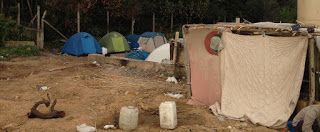The Eviction of the Former Post Office in Catania
On Tuesday 28 February, at 6am, the local police of Catania evicted the former post office building in Viale Africa. Despite having been completely abandoned for years, it has been used for a long time as an improvised refuge for various homeless persons, especially migrants and asylum seekers. The result of the police operation has been the charging of 18 people for violation of Article 633 of the Penal Code, punishing the invasion of a building or land for the ends of occupying it.
Among the young people taken to the police, and then immediately let go, were various Nigerians and Gambians, some of them with international or humanitarian protection, others having been left outside the CARA* at Mineo after having received a negative result from the Territorial Commission and are now in the process of appealing, and are thus legally present in Italy.
All of them have found themselves sleeping in a run-down building due to the daily failure of the reception system, a building which offered them only a minimum of peace. This is a situation which needed to be confronted through activating social services and finding a dignified alternative. Instead, chased out by the local authority, they have been left only with the street and a criminal charge for occupying, simply aggravating an already precarious situation.
The local administration in Catania clearly welcomed the security approach of the recent Minniti decree through which the national government has chosen to deal with the phenomenon of migration, and other phenomena of marginality and social exclusion. It is no accident that before approving the decree the mayor, Enzo Bianco, a former Minister of the Interior and current President of the National Association of Italian Councils (ANCI) had requested the government to speed up the process, in order to respond to “behaviour which is causing alarm within our society”, in order to confront the matter of security given that “the recent events in Berlin confirm how many targets are available for terrorists; exactly for this reason it is necessary to increase our checks across the country.” These are statements which are contributing to a rhetoric in which phenomena of social marginality is willingly overlapped and confused with questions of public order and national security, in the attempt to find consensus via the suffering not only of migrants, but of all the weaker strata of society.
It is clear that after years of crisis and cuts to local bodies, in which local councils can no longer guarantee essential services, and in which there are so many needs to be met, politicians are searching to legitimise the situation with vacuous and symbolic concepts such as security, decay, decorum and legality.
And it is thus that they evict the homeless without worrying about the implications or alternatives, just as they chase away the car cleaners and street sellers. These are scenes which we see periodically repeated in this country, where for years now problems which deserve very different measures and activities are met in terms merely of repression and public order. But it is precisely for this reason that we already know what the effects will be: greater marginality and more pockets of irregularity which simply worsen already complex situations. It is in this very moment that institutional agents ought react to the widening xenophobia by recognising peoples rights and guaranteeing them respect, instead of limiting them to attempts at following the populist tendencies which, little by little, risk bringing us right up to a chasm out of which it will be increasingly difficult to climb.
Nicolas Liuzzi
Borderline Sicilia
Project “OpenEurope” – Oxfam Italia, Diaconia Valdese, Borderline Sicilia Onlus
*CARA = Centro di Accoglienza per Richiedenti Asilo (Asylum Seeker Reception Centre)
Translation by Richard Braude



